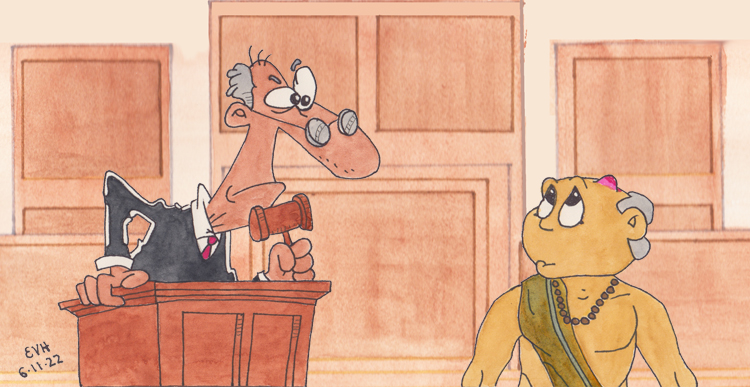
Jataka 332
Rathalaṭṭhi Jātaka
The Stick and the Carts
as told by Eric Van Horn
originally translated by H.T. Francis and R.A. Neil, Cambridge University
originally edited by Professor Edward Byles Cowell, Cambridge University
This is a simple tale about avoiding rash conclusions and coming to a just decision.
“Wounding another.” The Master told this story when he was at Jetavana. It is about the family priest of the King of Kosala. As he was driving in his chariot to a village on his estate, he came upon a caravan in a narrow road. He cried out repeatedly, “Out of the way with you!” He was so enraged at a cart not clearing out of his way that he threw his goad-stick at the driver. The stick struck against the yoke of the chariot, rebounded back and hit him on the forehead, causing a bump on his head. The priest turned back and went and told the King he had been wounded by some carters. The carters were summoned, and the judges examining the case found that only the priest was to blame. One day the matter was discussed in the Dharma Hall, how the King’s chaplain, who said he had been assaulted by some carters, ongoing to court was found guilty in his suit. When the Master came and inquired what the monks were discussing. On hearing what it was, he said, “Not only now, monks, but in the past this fellow also acted in precisely the same way.” And he then he told them this story from the past.
Once upon a time when Brahmadatta was reigning in Benares, the Bodhisatta became his lord justice. The King’s chaplain drove to a village where he was the headman, and acted in exactly the same way as in the previous tale. But in this version, when the King heard the priest’s story, he summoned the carters and himself sat in judgment. And without inquiring into the matter he said, “You have beaten my priest and caused a bump on his forehead.” He ordered all their property to be taken from them. Then the Bodhisatta said to him, “Sire, without even investigating the matter you order them to be deprived of all their goods. But some men, after inflicting wounds on themselves, declare that they have been wounded by someone else. Therefore it is wrong for one who bears rule to act in this way without trying the case. He ought not to act until he has heard everything.” And then he recited these verses:
Wounding another, his own wound he shows,
Himself the smiter, he complains of blows.
Wise men, O king, of partial views beware,
Hear both sides first, then judgment true declare.
The idle sensual layman I detest,
The false ascetic is a rogue confest.
A bad king will a case unheard decide,
Wrath in the sage can ne’er be justified.
The warrior prince a well-weighed verdict gives,
Of righteous judge the fame for ever lives.
On hearing the words of the Bodhisatta, the King decided to judge righteously, and when the case was duly tried, the blame was found to rest with the brahmin alone.

Figure: “The blame rests with you alone!”
The Master, his lesson ended, identified the birth: “The brahmin played the same part in both stories, and I was the wise minister in those days.”
